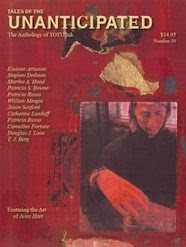Short stories are often my least favorite of the Hugo fiction categories, but this year's slate has a good ratio of two excellent stories (one that I nominated and one I would have if I had read it in time), two good ones, and one lousy one.
My top choice is "
Spar" by Kij Johnson, about a woman who escapes a spacewreck in a lifeboat shared by an amoeboid alien, with whom she cannot communicate except to engage in sexual intercourse. The opening line is, "In the tiny lifeboat, she and the alien fuck endlessly, relentlessly." Kij Johnson is usually an elegant writer, but this story is deliberately harsh. "
Spar" is not an enjoyable reading experience, but it is a powerful, memorable story. It has important things to say about gender issues and sexual politics, concepts Johnson could not convey without the SFnal premise. I suspect I will still have strong recollections of "
Spar" decades from now, that it will still be coming up in conversation. That is the kind of story I like to see win a Hugo Award.
I read most of the January 2009 issue of
Asimov's when it came out, but I skipped "
Bridesicle" by Will McIntosh, because the story idea sounded unpromising: young women who have died are kept frozen, in hopes that a rich man will come along to pay for the expensive procedure to revive them, in the future's version of mail-order brides. But McIntosh adds a crucial additional element, that another option for a dying person is to preserve his or her identity in the mind of a survivor. Our protagonist Mira is a frozen potential bride, who previously held her mother's personality, but it was lost when Mira died, to her guilty relief. To be resurrected, Mira must hope to marry a rich older man, even though she is gay, which makes the whole set-up a metaphor for societal barriers against gays. These different elements combine together nicely into a very strong story.
In "
The Bride of Frankenstein," Mike Resnick similarly writes of a bride in unusual circumstances. The story is a humorous take on the Frankenstein story, told from the point of view of Victor Frankenstein's bitchy, modern wife, who doesn't understand why he's squandering her stock portfolio for experiments on a hideous creature. Resnick takes the tale in a romantic direction I found quite charming.
N.K. Jemisin's "
Non-Zero Probabilities" is a well-crafted story, which finds an optimistic take on a daunting premise, basically that Murphy's Law has taken utter control of Manhattan. When the Hugo nominations came out, I started to read this, was quite enjoying it, and got well into the story before realizing that I already read it last year. So this is an enjoyable but not at all memorable story, completely the reverse of "
Spar." The good news for Jemisin is now I recall why I picked up that copy of
The Hundred Thousand Kingdoms sitting in my to-read pile.
Last and by far least is "
The Moment" by Lawrence M. Schoen, a dreadful piece that has no business on a Hugo ballot. The story is about aliens visiting Neil Armstrong's footprint on the moon, but you can't give Schoen credit for that mildly clever idea -- it was written for a theme anthology of stories about aliens visiting the astronauts' footprints on the moon. "
The Moment" is a hopeless jumble of sentences like, "The generation ship of Krenn frantically dumped velocity as it splooched from the fuel-efficient but mind-numbing slowness of intramolecular phasetransit back into the normal time-space continuum, less than a cubit above the moon." Perhaps this is meant as a tongue-in-cheek send-up of really bad pulp-era skiffy, but it is that only in the sense that "
The Moment" is itself really bad pulp-style skiffy. I actually wrote a long rant for this blog chastising whoever stuffed this turkey onto the ballot, but I think I won't publish it. I googled around and while I can't find much praise for this story, I also don't see that others have disliked it as much as I did. Rich Horton has called it "interesting" and "worth reading," so maybe I missed some redeeming quality.
Aaron's Ballot for Best Short Story1. Kij Johnson - Spar
2. Will McIntosh - Bridesicle
3. Mike Resnick - The Bride of Frankenstein
4. N.K. Jemisin - Non-Zero Probabilities
5. NO AWARD
6. Lawrence M. Schoen - The Moment
 We return to Issue #30 of Tales of the Unanticipated for another story recommendation of the week, Jason Sanford's "A Twenty-First Century Fairy Love Story."
We return to Issue #30 of Tales of the Unanticipated for another story recommendation of the week, Jason Sanford's "A Twenty-First Century Fairy Love Story."